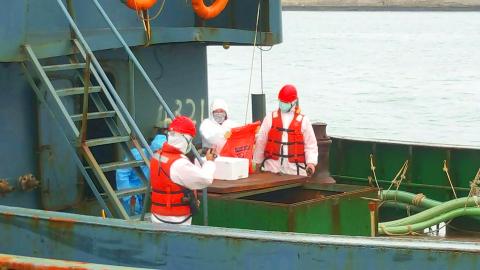Coast guard personnel yesterday confiscated raw pork from a Chinese ship in the nation’s contiguous zone near Penghu County, officials said.
The oil supply vessel was detected in waters about 20 nautical miles (37km) southwest of the county’s Cimei Township (七美) and increased speed after a coast guard patrol broadcast several warnings, the Coast Guard Administration said in a news release.
Coast guard personnel intercepted and boarded the ship, finding 10kg of raw pork packed in its onboard refrigerator, Fleet Branch official Chan Wen-chung (詹文中) said by telephone, adding that the ship’s crew claimed the pork was for their own consumption.

Photo: CNA
The pork was transferred to Council of Agriculture (COA) officials for disposal, and the coast guard took the six crew members to Magong City (馬公) for further questioning to determine whether they contravened the Act Governing Relations Between the People of the Taiwan Area and the Mainland Area (臺灣地區與大陸地區人民關係條例), Chan added.
COA Deputy Minister Huang Chin-cheng (黃金城) said that samples of the pork would be tested for African swine fever, while the remainder would be destroyed.
The crew might not be fined for storing the pork, even if the samples tested positive for the disease, as that they were not attempting to smuggle the pork into Taiwan, he said.
Since China reported its first infection of African swine fever in early August last year, the disease has spread to 23 provinces and regions, with a total of 104 cases reported as of Wednesday last week, although no new cases have been reported since then, council data showed.
China might have stopped reporting new infections to the World Organization for Animal Health, because it has been unable to keep the disease from spreading, Huang said.
The interval between new confirmations of infected pork products seized at customs has decreased from 64 days initially to less than a week, indicating that the disease is spreading unabated in China, he said.
As of yesterday, 12 seized pork products from China had tested positive for the disease, with the latest two, which were pork sausage products, confirmed on Thursday last week, council data showed.
To bolster quarantine checks at customs, the council is seeking funds from the Executive Yuan’s reserve budget of NT$500 million (US$16.2 million) to increase the number of sniffer dogs and X-ray scanners, but review of the proposed budget has been delayed due to a Cabinet reshuffle, Huang said, adding that he hopes the proposal will be approved soon.

INVESTIGATION: The case is the latest instance of a DPP figure being implicated in an espionage network accused of allegedly leaking information to Chinese intelligence Democratic Progressive Party (DPP) member Ho Jen-chieh (何仁傑) was detained and held incommunicado yesterday on suspicion of spying for China during his tenure as assistant to then-minister of foreign affairs Joseph Wu (吳釗燮). The Taipei District Prosecutors’ Office said Ho was implicated during its investigation into alleged spying activities by former Presidential Office consultant Wu Shang-yu (吳尚雨). Prosecutors said there is reason to believe Ho breached the National Security Act (國家安全法) by leaking classified Ministry of Foreign Affairs information to Chinese intelligence. Following interrogation, prosecutors petitioned the Taipei District Court to detain Ho, citing concerns over potential collusion or tampering of evidence. The

Seventy percent of middle and elementary schools now conduct English classes entirely in English, the Ministry of Education said, as it encourages schools nationwide to adopt this practice Minister of Education (MOE) Cheng Ying-yao (鄭英耀) is scheduled to present a report on the government’s bilingual education policy to the Legislative Yuan’s Education and Culture Committee today. The report would outline strategies aimed at expanding access to education, reducing regional disparities and improving talent cultivation. Implementation of bilingual education policies has varied across local governments, occasionally drawing public criticism. For example, some schools have required teachers of non-English subjects to pass English proficiency

NEGOTIATIONS: The US response to the countermeasures and plans Taiwan presented has been positive, including boosting procurement and investment, the president said Taiwan is included in the first group for trade negotiations with the US, President William Lai (賴清德) said yesterday, as he seeks to shield Taiwanese exporters from a 32 percent tariff. In Washington, US Trade Representative Jamieson Greer said in an interview on Fox News on Thursday that he would speak to his Taiwanese and Israeli counterparts yesterday about tariffs after holding a long discussion with the Vietnamese earlier. US President Donald Trump on Wednesday postponed punishing levies on multiple trade partners, including Taiwan, for three months after trillions of US dollars were wiped off global markets. He has maintained a 10 percent

TRADE: The premier pledged safeguards on ‘Made in Taiwan’ labeling, anti-dumping measures and stricter export controls to strengthen its position in trade talks Products labeled “made in Taiwan” must be genuinely made in Taiwan, Premier Cho Jung-tai (卓榮泰) said yesterday, vowing to enforce strict safeguards against “origin laundering” and initiate anti-dumping investigations to prevent China dumping its products in Taiwan. Cho made the remarks in a discussion session with representatives from industries in Kaohsiung. In response to the US government’s recent announcement of “reciprocal” tariffs on its trading partners, President William Lai (賴清德) and Cho last week began a series of consultations with industry leaders nationwide to gather feedback and address concerns. Taiwanese and US officials held a videoconference on Friday evening to discuss the